
The patent deals with adding a multi-touch interface to a capacitive touchscreen - the standard interface and touchscreen used for smartphones and tablets. Apple claims their patent restricts other companies from selling standard multi-touch displays without their permission. It is named in numerous lawsuits against companies including Samsung, HTC, and Motorola Mobility in around the world.
Last Friday the US International Trade Commission (ITC) released a preliminary ruling on an Apple complaint against Motorola Mobility which shoots down three patent claims, including infringement on that patent. Analyzing the ruling for his FOSS Patents blog, patent expert Florian Mueller characterized the ruling as potentially damaging to Apple's similar ITC action against Samsung.
He called the patent, "the broadest touchscreen-related hardware patent Apple has," adding, "if the courts interpreted it as broadly as Apple would like them to, it would be extremely hard to work around." However, Mueller also cautioned against reading too much into this (or any other) ITC ruling about smartphone patents:
I don't want to speculate about the outcome of Motorola's own complaint, but in general it appears that the ITC is not the forum in which any of the major smartphone disputes will be effectively decided by a single ruling that forces someone into a settlement. Litigants will need to win federal lawsuits, and all of the major Android-related disputes except for Oracle's lawsuit against Google include international litigations, particularly (but not only) in Germany. The outcome of those large disputes is likely going to depend on a combination of rulings in multiple jurisdictions, even though most of the major players probably thought at the outset that the ITC, which has tighter schedules than most United States district courts, was going to be the strategically most important venue.
The tighter schedules Meuller alluded to are the reason companies file complaints with the ITC in addition to federal district court. The HTC process is generally much faster than that of district courts, being intended for emergency relief so infringers cannot game the court system when the outcome of a patent dispute is obvious.
When there are significant disputes of patent validity and scope, as with most of the smartphone patent complaints, it seems much more reasonable to leave things up to the district courts. Particularly when Apple's sales don't appear any worse for all the alleged infringement.
Written by: Rich Fiscus @ 16 Jan 2012 16:21
